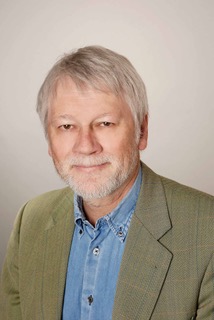- Immune genetics, Major Histocompatibility Complex, Optimal mate choice, Olfaction
Basic Information

(Feb 1950–)
Location: Oldenburg, Germany
Studied biology and mathematics at the University of Bielefeld, Germany, and the Ruhr-University Bochum. PhD (Dr. rer nat.) in Biology 1978. Habilitation ( venia legend) in 1985 from Ruhr-University Bochum. Guest Professor at the Department of Ecology, University of Bergen, Norway. Heisenberg Professor at the Department of Zoology, University of Oxford. From 1987 to 1999 Full Professor and Director of the Department of Behavioral Ecology and Vertebrate Biology at the University of Bern, Switzerland. From 1999 elected Scientific Member of the Max-Planck-Society and founding Director of the Max-Planck Institute for Evolutionary Biology, Plön, Germany. From 2000 Professor of the University of Kiel, Germany. From 2018 Director Emeritus at the Max Planck Institute for Evolutionary Biology, Plön, Germany.
Most important publications:
Reputation helps solve the ‘tragedy of the commons’
M Milinski, D Semmann, HJ Krambeck
Nature 415 (6870), 424-426, 2002
Cooperation through image scoring in humans
C Wedekind, M Milinski
Science 288 (5467), 850-852, 2000
Female sticklebacks use male coloration in mate choice and hence avoid parasitized males
M Milinski, T Bakker,
Nature 344 (6264), 330-333, 1990
M Milinski, R Heller
Nature 275 (5681), 642-644, 1978
Tit for tat in sticklebacks and the evolution of cooperation
M Milinski
Nature 325 (6103), 433-435, 1987
|
The efficient interaction of indirect reciprocity and costly punishment B Rockenbach, M Milinski Nature 444 (7120), 718-723, 2006 |
|
|
|
The collective-risk social dilemma and the prevention of simulated dangerous climate change M Milinski, RD Sommerfeld, HJ Krambeck, FA Reed, J Marotzke Proceedings of the National Academy of Sciences 105 (7), 2291-2294, 2008 |
|
|
Female sticklebacks count alleles in a strategy of sexual selection explaining MHC polymorphism
TBH Reusch, MA HaÈberli, PB Aeschlimann, M Milinski
Nature 414 (6861), 300-302, 2001
M Milinski, D Semmann, HJ Krambeck, J Marotzke
Proceedings of the National Academy of Sciences 103 (11), 3994-3998, 2006
Mate choice decisions of stickleback females predictably modified by MHC peptide ligands
M Milinski, S Griffiths, KM Wegner, TBH Reusch, A Haas-Assenbaum, ...
Proceedings of the National Academy of Sciences 102 (12), 4414-4418, 2005
Parasite selection for immunogenetic optimality
KM Wegner, M Kalbe, J Kurtz, TBH Reusch, M Milinski
Science 301 (5638), 1343-1343, 2003
Volunteering leads to rock–paper–scissors dynamics in a public goods game
D Semmann, HJ Krambeck, M Milinski
Nature 425 (6956), 390-393, 2003
C Eizaguirre, TL Lenz, M Kalbe, M Milinski
Nature communications 3 (1), 1-6, 2012
Working memory constrains human cooperation in the Prisoner’s Dilemma
M Milinski, C Wedekind
Proceedings of the National Academy of Sciences 95 (23), 13755-13758, 1998
Intra-and intergenerational discounting in the climate game
J Jacquet, K Hagel, C Hauert, J Marotzke, T Röhl, M Milinski
Nature climate change 3 (12), 1025-1028, 2013
The major histocompatibility complex, sexual selection, and mate choice
M Milinski
Annual Review of Ecology, Evolution, and Systematics, 159-186, 2006
Gossip as an alternative for direct observation in games of indirect reciprocity
RD Sommerfeld, HJ Krambeck, D Semmann, M Milinski
Proceedings of the national academy of sciences 104 (44), 17435-17440, 2007
S Centorrino, E Djemai, A Hopfensitz, M Milinski, P Seabright
Evolution and Human Behavior 36 (1), 8-16, 2015
|
Extortion subdues human players but is finally punished in the prisoner’s dilemma C Hilbe, T Röhl, M Milinski Nature communications 5 (1), 1-6, 2014 |
|
|
|
C Hilbe, A Traulsen, T Röhl, M Milinski Proceedings of the National Academy of Sciences 111 (2), 752-756, 2014 |
||
|
M Milinski, B Rockenbach Science 317 (5837), 464-465, 2007 |
|
|
|
Tit for tat and the evolution of cooperation in sticklebacks M Milinski Nature 325 (6103), 433-35, 1987 |
|
|
|
Humans choose representatives who enforce cooperation in social dilemmas through extortion M Milinski, C Hilbe, D Semmann, R Sommerfeld, J Marotzke Nature communications 7 (1), 1-9, 2016 |
||
When parasites disagree: Evidence for parasite‐induced sabotage of host manipulation
N Hafer, M Milinski
Evolution 69 (3), 611-620, 2015
The economic interaction between climate change mitigation, climate migration and poverty
J Marotzke, D Semmann, M Milinski
Nature Climate Change 10 (6), 518-525, 2020
Honor
Elected Scientific member of the Max Planck Society.
Elected member of the German Science Foundation Leopoldina.
Guest fellow of the Institute of Advanced Study of the Toulouse School of Economics, Fance.
Guest fellow of the Hanse Institute of Advanced Study, Delmenhorst, Germany
Editor and Editorial Board Member of various scientific journals.
